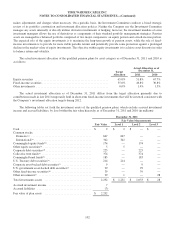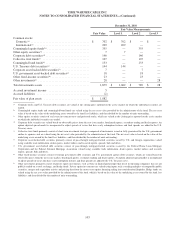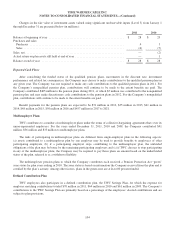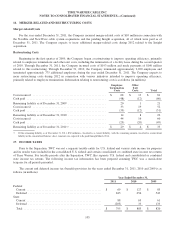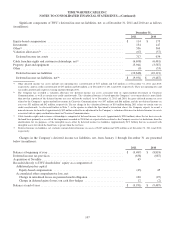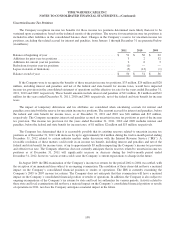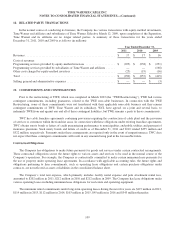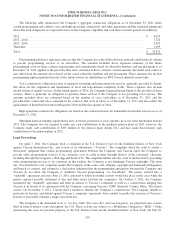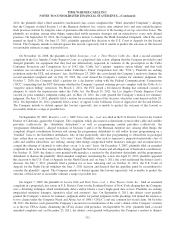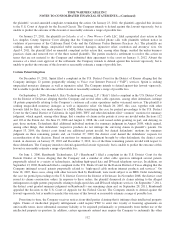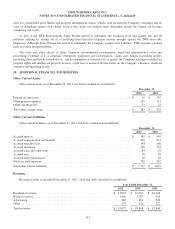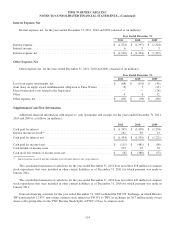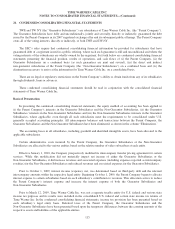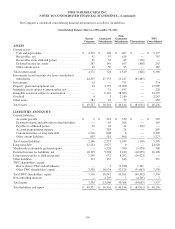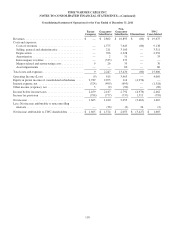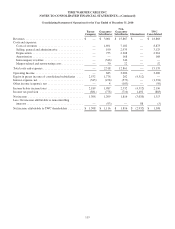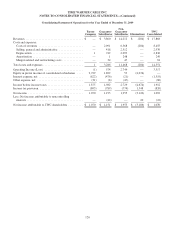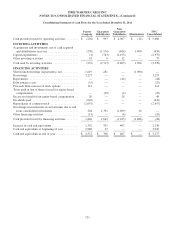Time Warner Cable 2011 Annual Report Download - page 120
Download and view the complete annual report
Please find page 120 of the 2011 Time Warner Cable annual report below. You can navigate through the pages in the report by either clicking on the pages listed below, or by using the keyword search tool below to find specific information within the annual report.TIME WARNER CABLE INC.
NOTES TO CONSOLIDATED FINANCIAL STATEMENTS—(Continued)
the plaintiffs’ second amended complaint, terminating the action. On January 23, 2012, the plaintiffs appealed this decision
to the U.S. Court of Appeals for the Second Circuit. The Company intends to defend against this lawsuit vigorously, but is
unable to predict the outcome of this lawsuit or reasonably estimate a range of possible loss.
On January 27, 2011, the plaintiffs in Calzada, et al. v. Time Warner Cable LLC, filed a purported class action in the
Los Angeles County Superior Court alleging that the Company recorded phone calls with plaintiffs without notice in
violation of provisions of the California Penal Code and the California Unfair Business Practices Act. The plaintiffs are
seeking, among other things, unspecified treble monetary damages, injunctive relief, restitution and attorneys’ fees. On
April 4, 2011, the plaintiff filed an amended complaint in this action that, among other things, omitted the unfair business
practices claim and removed two of the three named plaintiffs. The parties reached a settlement to resolve this action on
terms that are not material to the Company and submitted their agreement to the court on January 5, 2012. Absent the
issuance of a final court approval of the settlement, the Company intends to defend against this lawsuit vigorously, but is
unable to predict the outcome of this lawsuit or reasonably estimate a range of possible loss.
Certain Patent Litigation
On December 19, 2011, Sprint filed a complaint in the U.S. District Court for the District of Kansas alleging that the
Company infringes 12 patents purportedly relating to Voice over Internet Protocol (“VoIP”) services. Sprint is seeking
unspecified monetary damages as well as injunctive relief. The Company intends to defend against this lawsuit vigorously,
but is unable to predict the outcome of this lawsuit or reasonably estimate a range of possible loss.
On September 1, 2006, Ronald A. Katz Technology Licensing, L.P. (“Katz”) filed a complaint in the U.S. District Court
for the District of Delaware alleging that the Company and several other cable operators, among other defendants, infringe
18 patents purportedly relating to the Company’s customer call center operations and/or voicemail services. The plaintiff is
seeking unspecified monetary damages as well as injunctive relief. On March 20, 2007, this case, together with other
lawsuits filed by Katz, was made subject to a MDL Order transferring the case for pretrial proceedings to the U.S. District
Court for the Central District of California. In April 2008, TWC and other defendants filed “common” motions for summary
judgment, which argued, among other things, that a number of claims in the patents at issue are invalid under Sections 112
and 103 of the Patent Act. On June 19, 2008 and August 4, 2008, the court issued orders granting, in part, and denying, in
part, those motions. Defendants filed additional individual motions for summary judgment in August 2008, which argued,
among other things, that defendants’ respective products do not infringe the surviving claims in plaintiff’s patents. On
August 13, 2009, the district court found one additional patent invalid, but denied defendants’ motions for summary
judgment on three remaining patents and, on October 27, 2009, the district court denied the defendants’ requests for
reconsideration of the decision. Based on motions for summary judgment brought by other defendants, the district court
found, in decisions on January 29, 2010 and December 3, 2010, two of the three remaining patents invalid with respect to
those defendants. The Company intends to defend against this lawsuit vigorously, but is unable to predict the outcome of this
lawsuit or reasonably estimate a range of possible loss.
On June 1, 2006, Rembrandt Technologies, LP (“Rembrandt”) filed a complaint in the U.S. District Court for the
Eastern District of Texas alleging that the Company and a number of other cable operators infringed several patents
purportedly related to a variety of technologies, including high-speed data and IP-based telephony services. In addition, on
September 13, 2006, Rembrandt filed a complaint in the U.S. District Court for the Eastern District of Texas alleging that the
Company infringed several patents purportedly related to “high-speed cable modem internet products and services.” On
June 18, 2007, these cases, along with other lawsuits filed by Rembrandt, were made subject to an MDL Order transferring
the case for pretrial proceedings to the U.S. District Court for the District of Delaware. In November 2008, the district court
issued its claims construction orders. In response to these orders, the plaintiff dismissed its claims relating to the alleged
infringement of eight patents purportedly relating to high-speed data and IP-based telephony services. On September 7, 2011,
the district court granted summary judgment on Rembrandt’s one remaining claim and, on September 28, 2011, Rembrandt
appealed the decision to the U.S. Court of Appeals for the Federal Circuit. The Company intends to defend against the
lawsuit vigorously, but is unable to predict the outcome of this lawsuit or reasonably estimate a range of possible loss.
From time to time, the Company receives notices from third parties claiming that it infringes their intellectual property
rights. Claims of intellectual property infringement could require TWC to enter into royalty or licensing agreements on
unfavorable terms, incur substantial monetary liability or be enjoined preliminarily or permanently from further use of the
intellectual property in question. In addition, certain agreements entered may require the Company to indemnify the other
112


